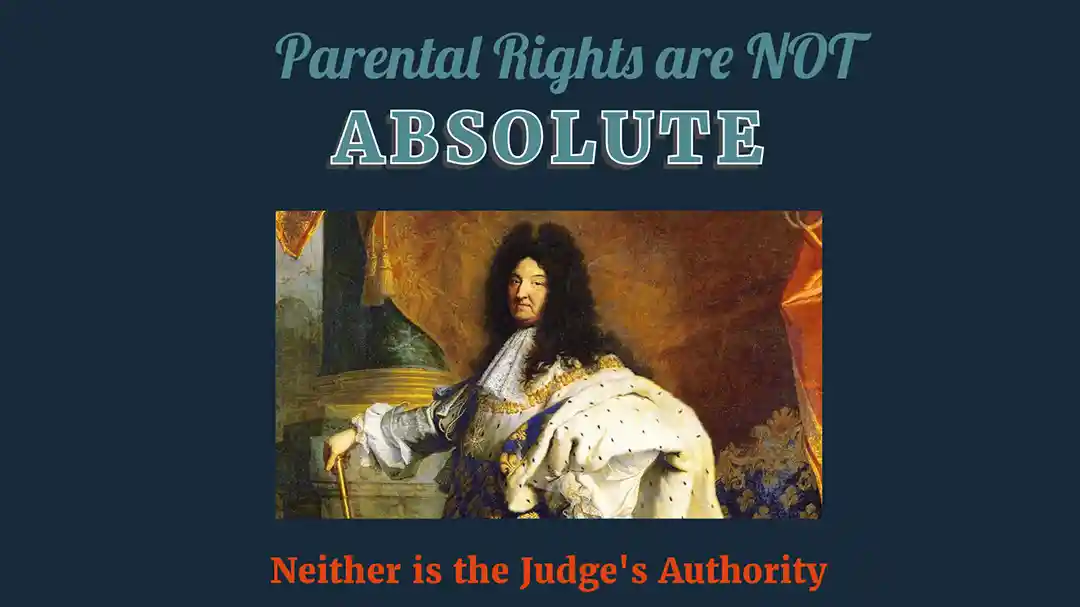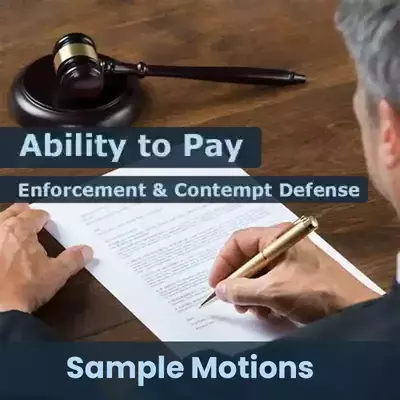How to respond when a child custody judge tells you that your parental rights are NOT absolute.
If you have ever asserted your rights in a child custody suit then you have likely heard a judge tell you that your parental rights are NOT absolute.
When you hear this phrase from a judge the odds are very high that your judge is telling you that he or she is a criminal who has criminal mens rea to unlawfully violate your civil rights.
There is NO doubt whatsoever that a judge’s intentional violation of your civil rights is a crime and this is the crime, 18 U.S.C. § 242 Deprivation of Rights Under Color of Law. See what the Justice Department has to say about this statute below.
What your judge is implying when they make this statement is that your rights are limited but their power is unlimited and this is an absolute lie designed to cover up criminal behavior.
The Fourteenth Amendment exists to limit the power of all state government which includes executive power, legislative power, and judicial power. It requires that state child custody judges provide federal due process standards to protect your rights and your child’s rights from any exercise of state judicial power.
When your judge enters your case predetermined to litigate the best interests of your nonparty nonlitigant child against your rights and predetermined to issue relief in your child’s best interests against your rights then your judge is entering the proceedings with criminal intent (mens rea) to violate your civil rights.
Procedural due process mandates that judges provide fundamentally fair judicial process. What is fair about predetermined outcomes? What is fair about depriving you of rights under the civil law without permitting you to challenge that civil law? What is fair about your judge acting as the state’s agent who is predetermined to impose the state’s civil law against you rather than protecting you from unlawful application of the civil law?
Procedural due process mandates that the state’s regulation of your fundamental rights is presumptively unconstitutional until the state appears and overcomes this constitutional presumption by entering testimony subject to your confrontation and cross-examination. When your judge waives this burden of proof, your judge acts criminally.
Substantive due process mandates that you are entitled to access to a state court where you can vindicate your federal rights before a neutral and impartial judicial decision-maker who is NOT predetermined to rule against your interests.
In child custody cases, the judge is on the state’s side against your interests and is acting as the state’s direct civil law agent imposing the state’s civil law as a state regulator against your interests and in the process deprives you of access to a neutral and impartial judicial decision-maker in your case.
Where the Supreme Court has held that your parental rights are fundamental rights, substantive due process mandates that the state demonstrates a compelling state interest and narrowly tailored state authority before it can limit your rights. Even then, the means the state uses must be the least restrictive option available to the state. Until this standard is met, your child custody judge has zero judicial jurisdiction to limit your rights.
Judges know that they act criminally when they knowingly act without jurisdiction.
Your judge should know full well that all the way back in 1984, the Supreme Court heard a child custody modification appeal and held that the state’s goal of acting in the child’s best interest was merely a “substantial” state interest which is less than “compelling” and therefore insufficient to justify infringements of fundamental rights protected by the compelling state interest test.
This means that the judge’s opinion of your child’s best interest has zero power to legitimately deprive you of your fundamental rights.
Your judge knows that only narrowly tailored state authority can be applied to limit your fundamental rights. Yet, your judge claims “broad discretion” to determine your child’s best interest and to use that merely substantive state justification to violate your fundamental rights. “Broad discretion” is literally the polar opposite of narrow tailoring.
Your judge has a duty to know the law and a duty to honestly apply the law. This duty is spelled out in your state’s Code of Judicial Conduct. Violations of this code are sanctionable and when you file complaints against your judge, this is the standard that your complaints should call out.
In most states child custody judges are authorized to impose NO Contact orders against parents based entirely upon their best interest viewpoint and their broad authority. As you can imagine, a NO Contact order is the polar opposite of least restrictive means.
All of this is imposed against you because the state classified you and your child as being undeserving of the same constitutional guarantees of all other parents and children.
Your parental rights are “individual” rights established individually by each parent through different methods and protected by the federal constitution as individual rights with zero dependence upon a marriage between the child’s parents. Yet your state’s family code presumes that only the rights of married parents and their children are constitutionally protected and the rights of unmarried parents or divorced parents and their children are de facto terminated by the absence of a marriage between the child’s parents.
This is the classic Bastardy Code relabeled to hide from the constitutional prohibition against Bastardy Codes. Your child is treated as a bastard child regardless of the state’s uses of other labels or protestations that your child is not an illegitimate child. What the state actually does rather than what the state simply claims is the true constitutional test.
It is unconstitutional for your state court judge to compare your rights as a divorced parent against the rights of married parents and claim that you are not similarly situated to married parents and thus your rights may be infringed. Your state court judge has a duty to know this simple inescapable rule of law.
It is straight up marital discrimination to claim that married parents have rights but unmarried parents or divorced parents do not. The criminality of the child custody courts is so blatant and so obvious that it is extremely difficult to believe that these judges could be so brazenly criminal, but they are undeniably acting intentionally criminally.
If your judge is NOT being intentionally criminal, then the alternative is that your judge is so incompetent in the basic law of this country as to be incompetent to be a judge. These are the only two options, openly criminal or stupidly incompetent.
How You Should Respond
The following is an example of how I would respond to any child custody judge who tried to tell me that my parental rights are not absolute:
Your Honor, I am fully aware that my fundamental rights are NOT absolute but then neither is your authority to violate my rights absolute. The Fourteenth Amendment directly limits your authority to violate my rights and the constitutional standard under both due process and equal protection that this court must meet is strict scrutiny.
The state’s interest in my child’s best interests, your viewpoint of my child’s best interests, and your claim of broad authority all violate strict scrutiny. The fact that my child has NOT and could NOT establish standing to have their best interests litigated or to receive judicial relief in their best interests deprives this Court of subject matter jurisdiction and this court proceeds in the complete absence of jurisdiction when it vindicates the state’s best interest public policy against my fundamental rights.
Vindicating the state’s best interest public policy in direct conflict with the rights of individuals is a regulatory action NOT a judicial action and it is impossible for this Court to simultaneously pursue the state’s policy interests against me and meet its constitutional mandate to provide fundamentally fair judicial process.
I demand litigation of my constitutional rights as against the state’s civil law regulation of my rights and I object to any claim by this Court that protecting my rights is contrary to my child’s best interests as a tyrannical absurdity that doesn’t pass the smell test.
Parents NOT judges determine their child’s best interests, and the First Amendment absolutely protects my right to disagree with the child’s other parent and with this Court regarding matters of conscience in child rearing and absolutely deprives this Court of any jurisdiction over matters of conscience in child-rearing.
18 U.S.C. § 242 Deprivation of Rights Under Color of Law
What the Justice Department says about this statute:
This provision makes it a crime for someone acting under color of law to willfully deprive a person of a right or privilege protected by the Constitution or laws of the United States. It is not necessary that the offense be motivated by racial bias or by any other animus.
Defendants act under color of law when they wield power vested by a government entity. Those prosecuted under the statute typically include police officers, sheriff’s deputies, and prison guards. However other government actors, such as judges, district attorneys, other public officials, and public school employees can also act under color of law and can be prosecuted under this statute.
Section 242 does not criminalize any particular type of abusive conduct. Instead, it incorporates by reference rights defined by the Constitution, federal statutes, and interpretive case law. Cases charged by federal prosecutors most often involve physical or sexual assaults. The Department has also prosecuted public officials for thefts, false arrests, evidence-planting, and failing to protect someone in custody from constitutional violations committed by others.
A violation of the statute is a misdemeanor, unless prosecutors prove one of the statutory aggravating factors such as a bodily injury, use of a dangerous weapon, kidnapping, aggravated sexual abuse, death resulting, or attempt to kill, in which case there are graduated penalties up to and including life in prison or death. If charged in conjunction with 18 U.S.C. § 250, as noted below, all sexual assaults under color of law are felonies.
Conclusion
Child custody judges injure children for money because they think parents are too stupid to call them out as criminals. While you can file a formal request with the US Attorney for your state to have your judge investigated for this crime, don’t expect them to be prosecuted. However, informing the judge in writing through a formal written objection to his or her violations and filing formal charges with the US Attorney will begin to expose these judges and put pressure on them to clean up their act.
If enough parents start to do this, US Attorneys might also feel pressure to actually enforce the law against these criminals. This has real teeth because judges don't have any judicial immunity against criminal actions.




























